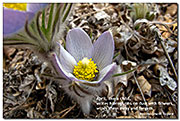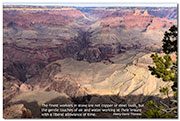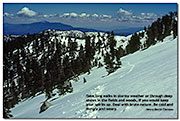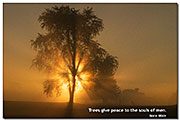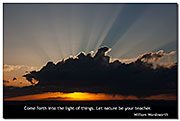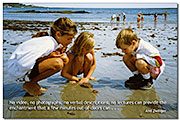Nature T-Z
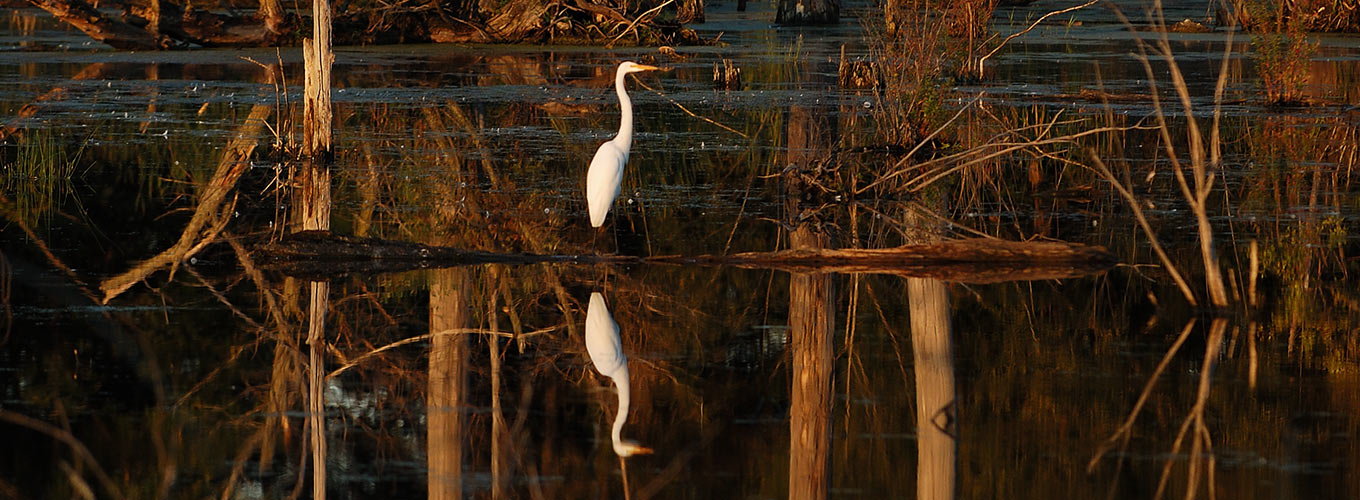
Nature quotes authors T-Z. For other pages, click the links below
April, like a child,
writes hieroglyphs on dust with flowers,
wipes them away and forgets.
Rabindranath Tagore (1861-1910) – The English Writings of Rabindranath Tagore: Volume 2 Poems, Introduction By Mohit K. Ray, Fireflies, Start Page 435, Quote Page 439, Published by Atlantic, New Delhi, India. Gallery of Nature Quotes
God, the Great Giver, can open the whole universe to our gaze in the narrow space of a single land.
Rabindranath Tagore (1861-1910) – Jeevan-Smriti
In nature, there is less death and destruction than death and transmutation.
Edward Way Teale (1899-1980) – Circle of the Seasons: The Journal of a Naturalist’s Year, “July 5,” (1953)
For man, autumn is a time of harvest, of gathering together. For nature, it is a time of sowing, of scattering abroad.
Edward Way Teale (1899-1980) – Autumn Across America, 1956
The difference between utility and utility plus beauty is the difference between telephone wires and the spider’s web.
Edward Way Teale (1899-1980) – “September 18,” Circle of the Seasons (1953)
Commonly we stride through the out-of-doors too swiftly to see more than the most obvious and prominent things. For observing nature, the best pace is a snail’s pace.
Edward Way Teale (1899-1980) – “July 14,” Circle of the Seasons (1953)
Any man that walks the mead
In bud, or blade, or bloom, may find,
According as his humors lead,
A meaning suited to his mind.
Lord Alfred Tennyson (1809-1892) – “The Day Dream”
Nature is avariciously frugal; In matter it allows no atom to elude its grasp; in mind, no thought or feeling to perish. It gathers up the fragments that nothing be lost.
David Thomas – (1776-1859), American agricultural writer – Quoted in: A dictionary of thoughts: being a cyclopedia of laconic quotations from the best authors of the world, both ancient and modern, edited by Tryon Edwards, 1908.
My profession is to always find God in nature, to know His lurking places, to attend to all the oratorios, the operas in nature.
Henry David Thoreau (1817-1862) – Journal, September 7, 1851
I went to the woods because I wished to live deliberately, to front only the essential facts of life, and see if I could not learn what it had to teach, and not, when I came to die, discover that I had not lived.
Henry David Thoreau (1817-1862) – Walden, Chapter 2, 1854
A taste for the beautiful is most cultivated out of doors, where there is no house and no housekeeper.
Henry David Thoreau (1817-1862) – Walden, Chapter 1, part C, 1854
It is the marriage of the soul with Nature that makes the intellect fruitful, and gives birth to imagination.
Henry David Thoreau (1817-1862) – Journal, Aug. 21, 1851
The finest workers in stone are not copper or steel tools, but the gentle touches of air and water working at their leisure with a liberal allowance of time.
Henry David Thoreau (1817-1862) – A Week on the Concord and Merrimack Rivers, New York, Crowell, 1911, p 310.
Gallery of Nature Quotes
The West of which I speak is but another name for the Wild, and what I have been preparing to say is, that in Wildness is the preservation of the World
Henry David Thoreau (1817-1862)- speech at Concord Lyceum, 23 April 1851 and subsequently, in Thoreau’s essay “Walking”, Atlantic Monthly, June 1862 (v.9 no. 56)
Nature is full of genius, full of the divinity; so that not a snowflake escapes its fashioning hand.
Henry David Thoreau (1817-1862)- Journals (1838-1859) – January 5, 1856
I long for wildness, a nature which I cannot put my foot through, woods where the wood thrush forever sings, where the hours are early morning ones, and there is dew on the grass, and the day is forever unproved, where I might have a fertile unknown for a soil about me.
Henry David Thoreau (1817-1862) – Journal, 22 June 1853
The indescribable innocence and beneficence of Nature, —of sun and wind and rain, of summer and winter,—such health, such cheer, they afford forever! and such sympathy have they ever with our race, that all Nature would be affected, and the sun’s brightness fade, and the winds would sigh humanely, and the clouds rain tears, and the woods shed their leaves and put on mourning in midsummer, if any man should ever for a just cause grieve.
Henry David Thoreau (1817-1862) – Walden – (Solitude), NY, Crowell & Co, 1910, p 182.
Every creature is better alive than dead, men and moose and pine-trees, and he who understands it aright will rather preserve its life than destroy it.
Henry David Thoreau (1817-1862) – The Maine Woods (1864), NY, Crowell & Co., p132.
Nature will bear the closest inspection. She invites us to lay our level with her smallest leaf, and take an insect view of its plain. She has no interstices; every part is full of life.
Henry David Thoreau (1817-1862) – The Writings of Henry David Thoreau, (Vol 9), Natural History of Massachusetts (p123), Houghton Mifflin Co., Boston, MA 1893
Nature will bear the closest inspection. She invites us to lay our level with her smallest leaf, and take an insect view of its plain. She has no interstices; every part is full of life.
Henry David Thoreau (1817-1862) – The Writings of Henry David Thoreau, (Vol 9), Natural History of Massachusetts (p123), Houghton Mifflin Co., Boston, MA 1893
Nature is an admirable schoolmistress.
Henry David Thoreau (1817-1862) – Letter, August 18, 1857, to Daniel Ricketson, in The Writings of Henry David Thoreau, vol. 6, p. 312, Houghton Mifflin (1906)
Nature is fair in proportion as the youth is pure. The heavens and the earth are one flower ; the earth is the calyx, the heavens the corolla.
Henry David Thoreau (1817-1862) – Journals, June 5, 1853, P.M. To Mason’s pasture.
The very uprightness of the pines and maples asserts the ancient rectitude and vigor of nature. Our lives need the relief of such a background, where the pine flourishes and the jay still screams.
Henry David Thoreau (1817-1862) – A Week on the Concord and Merrimack Rivers (1849), in The Writings of Henry David Thoreau, vol. 1, p. 179, Houghton Mifflin (1906)
Nature must be viewed humanly to be viewed at all; that is, her scenes must be associated with humane affections, such as are associated with one’s native place. She is most significant to a lover. A lover of Nature is preeminently a lover of man. If I have no friend, what is Nature to me? She ceases to be morally significant. . .
Henry David Thoreau (1817-1862) – The Journal of Henry David Thoreau (Vol 4), June 30, 1852 (p. 163) Houghton Mifflin Co., Boston, MA, 1906.
I wish to speak a word for Nature, for absolute freedom and wildness, as contrasted with a freedom and culture merely civil, — to regard man as an inhabitant, or a part and parcel of Nature, rather than a member of society.
Henry David Thoreau (1817-1862), Essay, first delivered as a series of lectures. It was first published in the Atlantic as an essay, and reprinted as Walking, after his death. This is the opening sentence of that work.
Take long walks in stormy weather or through deep snows in the fields and woods, if you would keep your spirits up. Deal with brute nature. Be cold and hungry and weary.
Henry David Thoreau (1817-1862) – The Journal of Henry David Thoreau (Vol 9), December 25, (p. 198) Houghton Mifflin Co., Boston, MA, 1906. p 186
Gallery of Nature Quotes
The laws of nature are the skeleton of the universe. They support it, give it shape, tie it together. Taken as a whole, they embody a vision of our world that is both breathtaking and awe-inspiring.
James Trefil (1938 – ) – The Nature of Science, Houghton Mifflin Harcourt, 2003, Introduction (p vii)
However much you knock at nature’s door, she will never answer you in comprehensible words.
Ivan Sergeevich Turgenev (1818-1883) – Shubin, in On the Eve, ch. 1 (1860)
Nature knows no indecencies; man invents them.
Mark Twain (1835-1910) – Mark Twain’s Notebook, 1935, p. 288.
The human spirit needs places where nature has not been rearranged by the hand of man.
Unknown
The whole of nature is a conjugation of the verb to eat, in the active and passive.
Unknown – William Ralph Inge mentions the “saying” in his piece Outspoken Essays, “But the whole of nature, as has been said, is a conjugation of the verb to eat, in the active and passive.”, 2003, p56
The universe is like a safe to which there is a combination, but the combination is locked up in the safe.
Peter De Vries (1910-1993) – Let me Count the ways, Little Brown & Co, 1965
Men argue, nature acts.
Voltaire (1694-1778) – Voltaire’s Philosophical Dictionary, Echo Library, 2010, p. 193
Happiness is a good that nature sells us.
Voltaire (1694-1778) – “Discourses on Man, Number 4,” in Life of Voltaire, Volume 2, James Parton, 1889, 332
“If God did not exist, he would have to be invented.” But all nature cries aloud that he does exist: that there is a supreme intelligence, an immense power, an admirable order, and everything teaches us our own dependence on it.
Voltaire (1694-1778) – Letter to Prince Frederick William of Prussia (28 November, 1770), Voltaire in His Letters, translated by S.G. Tallentyre, 1919.
Nature consults no philosophers.
John Walker (1731-1803) – Lectures on Geology: including hydrography, mineralogy, and meteorology, with an introduction to biology, Biographical introduction (p. xxxi), University of Chicago Press, 1966.
Trees give peace to the souls of men.
Nora Waln (1895-1964) – Reaching for the Stars, 1939.
Gallery of Nature Quotes
Adapt or perish, now as ever, is nature’s inexorable imperative.
H.G. Wells (1866-1946) – Mind at the end of it’s teather. Heinemann Ltd, London, (1945) , p. 19
It is only now and then, in a jungle, or amidst the towering white menace of a burnt or burning Australian forest, that Nature strips the moral veils from vegetation and we apprehend its stark ferocity.
H.G. Wells (1866-1946) – The Happy Turning (1946) 33-34.
It’s amazing how quickly nature consumes human places after we turn our backs on them. Life is a hungry thing.
Scott Westerfeld (1963 – ) – Quoted in Dictionary of Quotations, ed M. Kumar, Aph Publishing, 2008, p. 169
Nature does not capriciously scatter her secrets as golden gifts to lazy pets and luxurious darlings, but imposes tasks when she presents opportunities, and uplifts him whom she would inform. The apple that she drops at the feet of Newton is but a coy invitation to follow her to the stars.
Edwin Percy Whipple (1816-1886) – Character and Characteristic Men, Chapter III, p 78, 1877
I would feel more optimistic about a bright future for man if he spent less time proving that he can outwit Nature and more time tasting her sweetness and respecting her seniority.
E.B. White ( 1899-1985) “Coon Tree” – Essays of E.B. White (1977)
I am pessimistic about the human race because it is too ingenious for its own good. Our approach to nature is to beat it into submission. We would stand a better chance of survival if we accommodated ourselves to this planet and viewed it appreciatively instead of skeptically and dictatorially.
E.B. White ( 1899-1985) – Quoted in the Epigraph to Silent Spring by Rachel Carson
Nature, even in the act of satisfying anticipation, often provides a surprise.
Alfred North Whitehead (1861-1947) – Adventures of Ideas, Chapter VIII, p. 161, The MacMillan Co., NY, NY, 1956
I believe a leaf of grass is no less than the journey-work of the stars.
Walt Whitman (1819-1892) – Leaves of Grass, 31
You must not know too much, or be too precise or scientific about birds and trees and flowers and water-craft; a certain free margin, and even vagueness—perhaps ignorance, credulity—helps your enjoyment of these things…
Walt Whitman (1819-1892) – Prose Works, 1892, I. Specimen Days, May 14.
There is religion in everything around us, — a calm and holy religion in the unbreathing things of Nature, which man would do well to imitate.
John Greenleaf Whittier (1807-1892) – The Boston Literary Magazine, Clapp & Hull, 1833, p245. Attributed to John Ruskin who would have been 14 at the time this was published. Whittier was 26. Additionally the quote appears in “Extracts of Whittier’s Prose,” in Wreath for St. Crispin, J. Prince, Boston, 1848, p209. In 1950, Jean C.S.Wilson and David A.Randall published Thirteen Author Collections Of The Nineteenth Century and Five Centuries Of Familiar Quotations, in which they note that “Religion in Everything” was first published in the book Wreath for St. Crispin. (p 765). Discussion here.
It seems to me that we all look at nature too much, and live with her too little.
Oscar Wilde (1854-1900) – The Complete Writings of Oscar Wilde, De Profundis, p 158, Nottingham Society, NY, NY, 1907
To be whole. To be complete. Wildness reminds us what it means to be human, what we are connected to rather than what we are separate from.
Terry Tempest Williams (1955 – ), testimony before the Senate Subcommittee on Forest & Public Lands Management regarding the Utah Public Lands Management Act of 1995. Washington, D.C. July 13, 1995.
When coyotes howl outside your tent, that may be adventure. While you’re sweating like a horse in a climb over a 12,000 foot pass, that’s adventure. When howling headwinds press your lips against your teeth, you face a mighty adventure. While trudging through a raging rainstorm, adventure drenches you. But that’s not what makes adventure. It is your willingness to struggle through it, to present yourself at the doorstep of Nature. Can any greater joy come from life than living inside the ‘moment’ of an adventure? It may be a fleeting ‘high’, a stranger that changes your life, an animal that delights you or frightens you, a struggle where you triumphed, or even failed, yet you braved the challenge. Those moments present you uncommon experiences that give your life eternal expectation. That’s adventure.
Frosty Woodbridge (1947 – ) – How to Live a Life of Adventure: The Art of Exploring the World, Author House, 2011
It is the preservation of the species, not of individuals, which appears to be the design of Deity throughout the whole of nature.
Mary Wollstonecraft (1759 – 1797) – Letters written during a short residence in Sweden, Norway and Denmark, Letter 22, 1796
Come forth into the light of things. Let nature be your teacher.
William Wordsworth (1770-1850) – The Tables Turned, 1798
Gallery of Nature Quotes
One impulse from a vernal wood
May teach you more of man,
Of moral evil and of good,
Than all the sages can.
William Wordsworth (1770-1850)- The Tables Turned, 1798
Study nature, love nature, stay close to nature. It will never fail you.
Frank Lloyd Wright (1867-1959) – quoted in The Wright Style (1992) by Carla Lind, p. 3
Who lives to Nature, rarely can be poor ; who lives to fancy, never can be rich.
Edward Young (1681-1765) – The Complaint; or Night Thoughts on Life, Death and Immortality, Night VI, Nelson and Brown, 1831, p. 110
Say’st thou, “The course of nature governs all?”
The course of nature is the art of God.
Edward Young (1681-1765) – The Complaint; or Night Thoughts on Life, Death and Immortality, “The Consolation,” Night Nine, Nelson and Brown, 1831, p. 229.
Take God from nature, nothing great is left.
Edward Young (1681-1765) – The Complaint; or Night Thoughts on Life, Death and Immortality, “The Consolation,”, Nelson and Brown, 1831, p. 233.
Nature delights in progress; in advance.
Edward Young (1681-1765) – The Complaint; or Night Thoughts on Life, Death and Immortality, “The Consolation,” Nelson and Brown, 1831, p. 247.
The laws of nature are . . . Thoughts of God.
Heinrich Zschokke (1771-1848) – Zschokke’s Tales, “Harmonius,” in Tales from the German of Heinrich Zschokke, Volumes 1-2, 1845.
The life of the wood, meadow, and lake go on without us. Flowers bloom, set seed and die back; squirrels hide nuts in the fall and scold all year long; bobcats track the snowy lake in winter; deer browse the willow shoots in spring. Humans are but intruders who have presumed the right to be observers, and who, out of observation, find understanding.
Ann Zwinger (1925 – 2014) – Beyond the Aspen Grove, 1970, 2002 Edition, Johnson Printing, Boulder Colorado, p9.
There will always be something new to discover: a minute moss never found before, a rabbit eating birdseed with the bores on a hungry November day, a bittern that stays only long enough to be remembered.
Ann Zwinger (1925 – 2014) – Beyond the Aspen Grove, 1970, 2002 Edition, Johnson Printing, Boulder Colorado, p9.
No video, no photographs, no verbal descriptions, no lectures can provide the enchantment that a few minutes out-of-doors can: watch a spider construct a web; observe a caterpillar systematically ravaging the edge of a leaf; close your eyes, cup your hands behind your ears, and listen to aspen leaves rustle or a stream muse about its pools and eddies. Nothing can replace plucking a cluster of pine needles and rolling them in your fingers to feel how they’re put together, or discovering that “sedges have edges and grasses are round,” The firsthand, right-and-left-brain experience of being in the out-of-doors involves all the senses including some we’ve forgotten about, like smelling water a mile away. No teacher, no student, can help but sense and absorb the larger ecological rhythms at work here, and the intertwining of intricate, varied and complex strands that characterize a rich, healthy natural world.
Ann Zwinger (1925 – 2014) Clair Walker Leslie, Into the Field: A Guide to locally focused Teaching, 1999, Introduction by Ann Zwinger.
Gallery of Nature Quotes
Nature quotes authors T-Z. For other pages, click the links below
- David Alan
- Last Updated April 18, 2024
